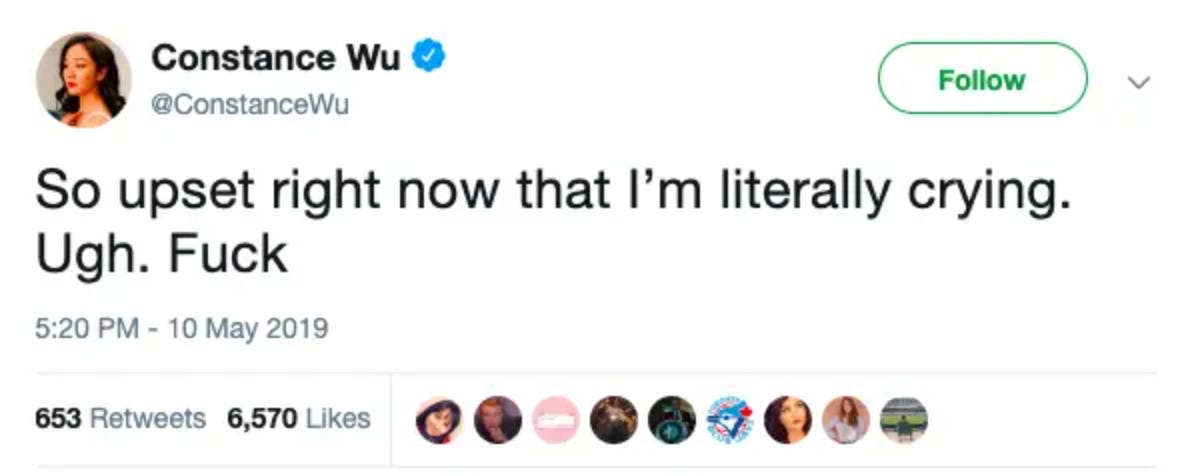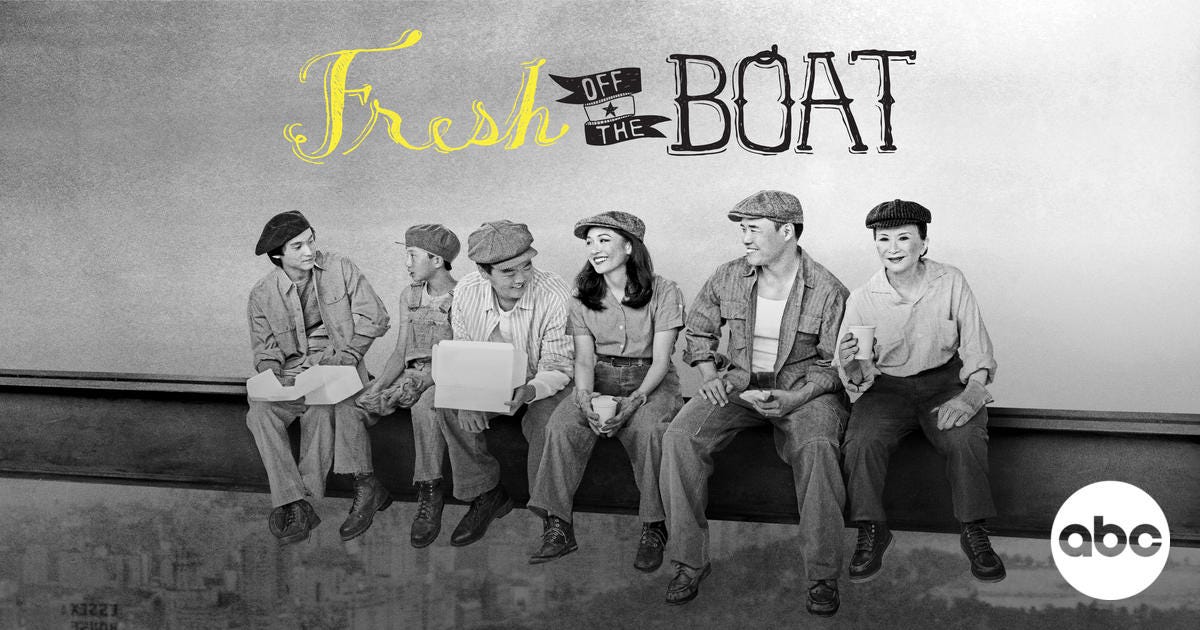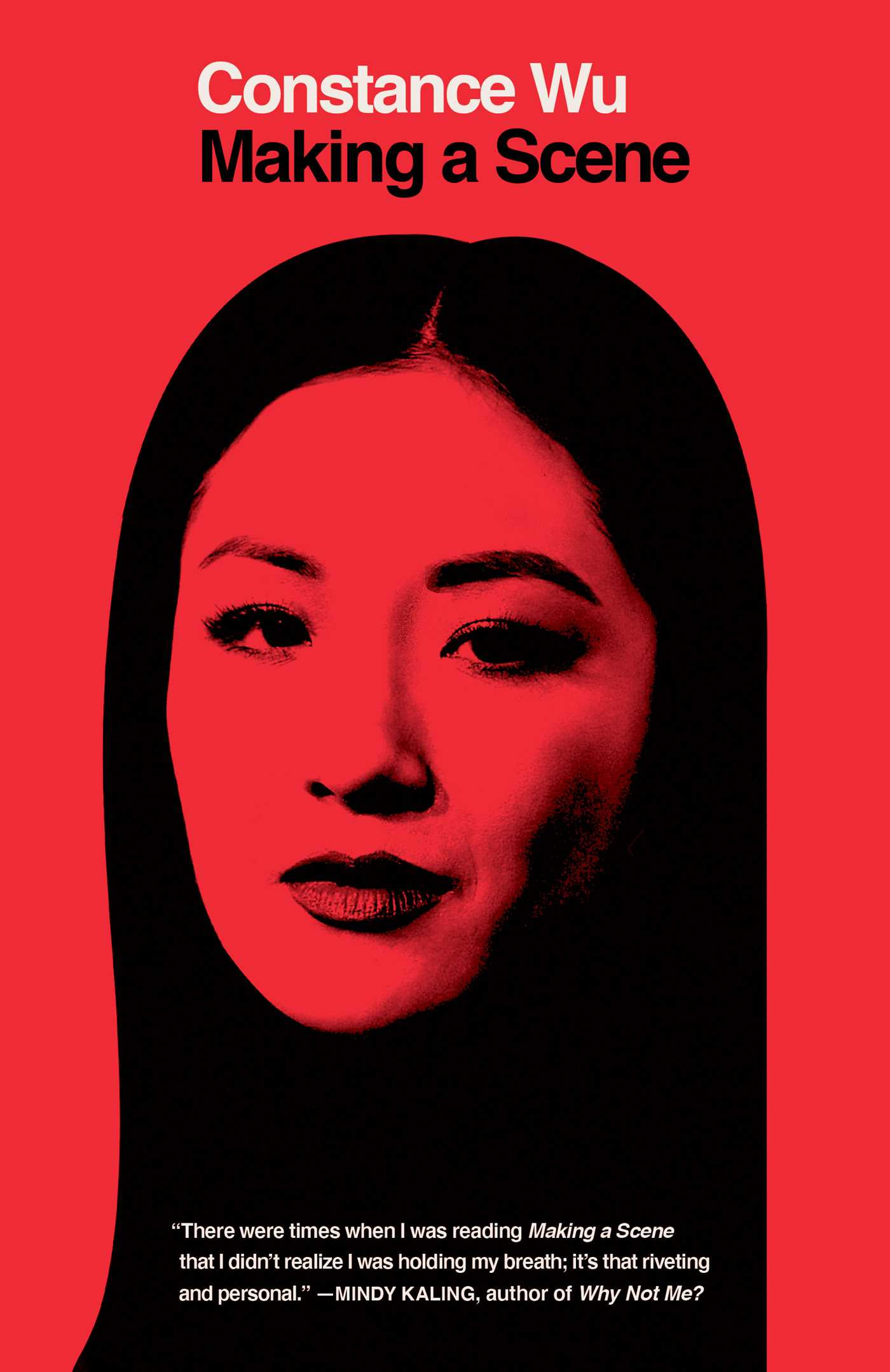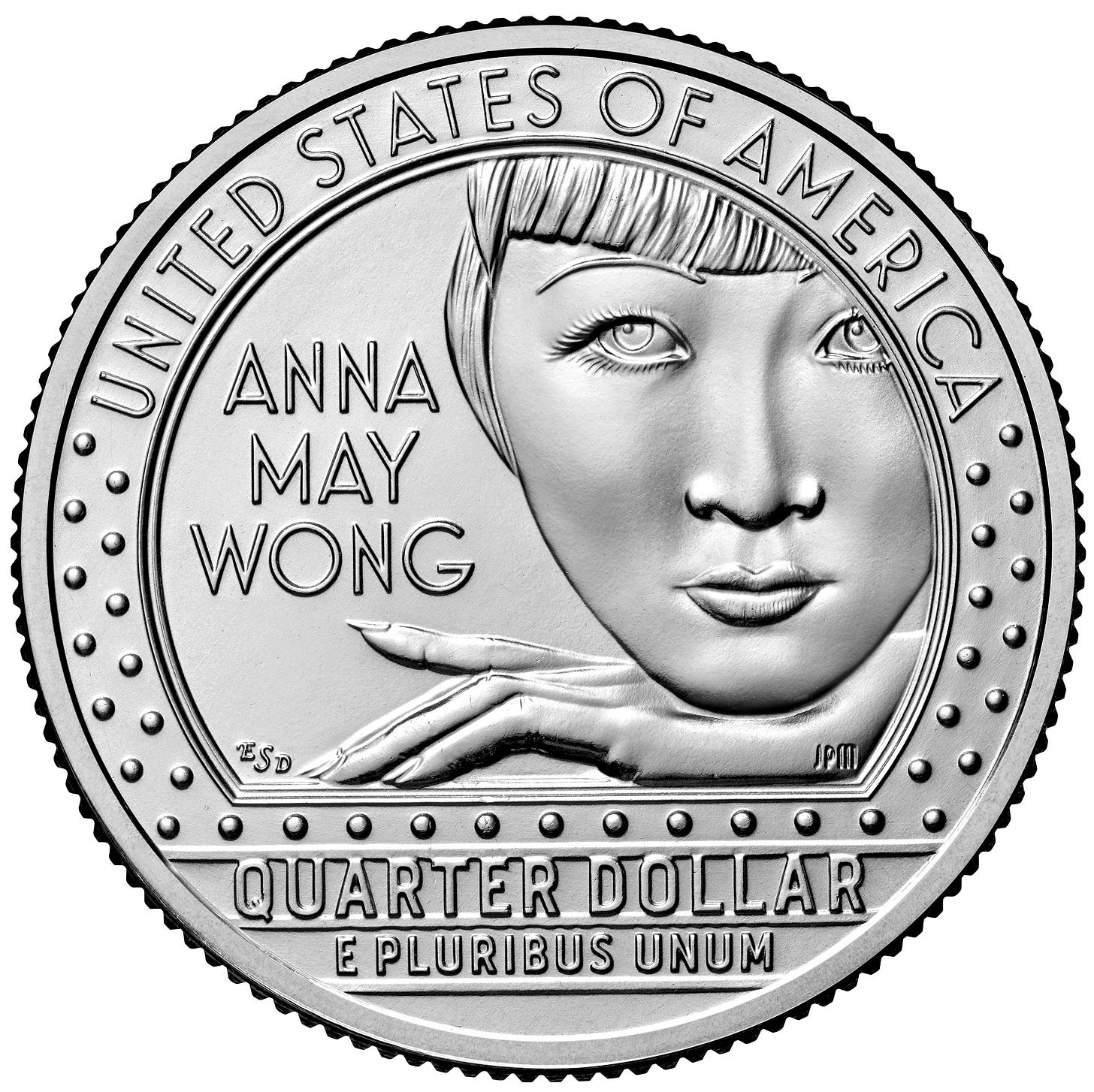When We Eat Our Own
Constance Wu and the impossible expectations of representation
Constance Wu was all over the media this past week on a redemption tour of sorts as she promotes her new book, a memoir in essays called Making a Scene. Like many Asian Americans, I’ve had ambivalent, sometimes even negative, feelings about her. I heard the rumors—that she was high-strung, a perfectionist. That she was strangely reclusive and regularly declined to hang out with her co-stars in order to memorize her lines. That the other actors from Fresh Off the Boat and Crazy Rich Asians didn’t like her. That she was a diva.
How anyone in my social circle could actually be privy to this information is still a mystery, but someone put out the word, it got around and had a consistent theme to it. Constance Wu was not the Asian American movie star we wanted her to be.
So when The Tweet happened in 2019—an expression of frustration and anger seemingly in response to FOTB being surprise renewed for a sixth season—the internet temporarily broke. A lapse in judgment, ten words posted in a very public forum, served as proof that everyone’s suspicions about Constance Wu were woefully correct.

A blitz of social media shaming followed and the Twitter trolls came out hard.
It only ended when Constance Wu abruptly cut off Twitter, Instagram, and the rest of her social presence online. She went dark for three years.
When I first learned about her memoir-in-progress, my husband (who also works in the book business) and I talked about the viability of such a project. I agreed with him that it would sell. Let’s be honest, haters love a good hate-read and even the casual observer is usually drawn to controversial figures. But he wanted to understand why people, Asian Americans specifically, didn’t like her. It was hard to explain exactly, even coming from someone who professed not to be a fan.
I told him I’d watched an interview where she said she didn’t think of herself as an activist for Asian American representation and that she merely wanted to be an actress. That rubbed me the wrong way. Wasn’t it her responsibility now to be both? It also bothered me that in her best-known role as Jenny Huang, matriarch of the Huang family in FOTB, she speaks English with a Taiwanese accent. Why did she have to play an Asian character who speaks in accented English when she’s American-born?
In truth, I’ve never even watched FOTB. (Funny thing about the internet is that anyone can have an opinion about things they know nothing about.) But I was excited back in 2015 when it was announced that Eddie Huang’s memoir Fresh Off the Boat was going to be made into a sitcom for network television. I knew how historic it was going to be. The last Asian American family-centered sitcom was Margaret Cho’s All-American Girl in the mid-90s, which ended somewhat disastrously. The network canceled it after one season and kids like me were left hanging with the possibility of what could have been.
Constance Wu’s public meltdown was just another disappointment on the road to Asian American representation. I’d been there before. So I didn’t bother to look closer, even though something told me there had to be more behind her tweet than just not wanting to work on FOTB anymore. Constance Wu wasn’t going to elaborate and give us the answers we wanted, though. So I wrote her off like everyone else.
Some part of me, however, did wonder whether I would have felt the same way about Anna May Wong if she and I had lived contemporaneously. Would I have judged AMW just as harshly for taking on roles where she played the floozy, the doomed butterfly, the scheming Oriental? Nah, I brushed it off. AMW never would have behaved the way Constance Wu did. She wouldn’t have lost her composure. She took her work as the only Asian American actress of note in Hollywood very seriously.
Well, Constance Wu finally spoke her truth this week. I was stunned by the tearful interview she gave to Juju Chang on ABC (the same network that originally aired FOTB). She revealed to Chang: “My first couple of years on FOTB I was sexually harassed by a producer and I was intimidated and threatened a lot by him. It was my first ever network TV job and I was constantly terrified of being fired.”
Of course, I immediately bought her memoir and compulsively read the chapter on her assaulter. (People always want the dirt!) According to her book, the producer who assaulted her was Asian American and deeply ensconced in high-powered Hollywood circles, which he made sure everyone knew by constantly name-dropping. (If you want to know who it is, it’s not hard to figure out. There was only one Asian producer on FOTB.)
In the beginning, Constance saw him as a mentor figure, an ally who could show her the ropes of the business. So when he said, “You do what I say,” Constance readily listened. Their friendly relationship quickly warped into one of domineering control. Soon he made her switch to his preferred agent and deal with him directly rather than letting her reps work out business details. He repeatedly asked her to send him selfies and wanted to see pictures of her friends so he could judge their looks. At a Lakers game, which he all but coerced her to attend, he put his hand on her thigh and worked his way up to her crotch. That’s where Constance drew the line and asked him what the hell he was doing. “Relax. It’s a compliment,” he responded casually.
The fall out from that day impacted Constance much more than it did her assaulter, as these things usually do when the assaulter is in a position of power. The producer visibly stopped talking to her on set, making it appear to her colleagues as though she was the one acting like a diva. Constance was too scared to report the incident to HR. She worried that it wasn’t “bad enough” or that people wouldn’t believe her. The few people she did tell, still treated her abuser with respect and camaraderie (what could they do, he was their boss), which irked her even more. Admittedly, she often behaved badly on set—she was acting out because of the thing she couldn’t name.
Sometimes the evidence is so obvious we think it points to only one conclusion, when in fact it’s something else entirely, something we never saw coming.
One thing that Constance said in the interview struck me like a rock over the head. She said the backlash from her tweets inspired thoughts of suicide. One night she found herself standing on the roof of her NYC apartment building, thinking about jumping. It was private messages from another Asian actress that almost sent her over the ledge.
“She sent me some DMs shaming me to the point of me thinking that I needed to end my own life,” Constance recalled through sobs. “She basically said I had become a blight on the Asian American community and nothing I could ever do would make up for the damage I’d done to the community. That I was like a disgrace. And it made me feel like Asian Americans feel like it would be better if I just didn’t exist.”
I can imagine Anna May Wong confessing to similar feelings of rejection in response to the horrendous treatment she received from Hollywood, disapproving Chinese Americans, and the callous Chinese press. On the one hand, the film industry’s racism kept AMW in minor or heavily stereotyped roles for much of her career. On the other hand, many in her own community, whether fellow Chinese Americans or Chinese in China, vocally decried her film work. As they claimed, AMW misrepresented Chinese women and helped spread less than flattering depictions of Chinese culture to an already prejudiced Western world.

Many of AMW’s films were banned in China, including Shanghai Express (1932), which I consider one of her best. In a December 5, 1931 article in the Chinese publication Pictorial Weekly, the headline screams: “PARAMOUNT UTILIZES ANNA MAY WONG TO PRODUCE PICTURE TO DISGRACE CHINA.” Somehow a single actress scandalized a nation of 400 million.
During her year in China, AMW often faced these types of accusations and was asked by reporters and ordinary citizens alike to account for herself. “Chinese government people complained I’d too often portrayed a sinister, inscrutable character and was contributing to misconceptions of the Chinese,” Anna May later recalled. “I explained that when you’re starting in the motion pictures, you take the jobs you’re offered.”
The Chinese press took every opportunity to cut AMW down to size: they criticized her outfit and compared it to something a nun would wear; they said she looked old for her age; they complained that she only spent time with the country’s Western-educated elite, that she could care less about the common people. And these were merely the insults lobbed at her in the first few days after her arrival in Shanghai. The media there was known to dig early graves for the country’s most alluring, shining stars. Chinese screen goddess Ruan Lingyu committed suicide in 1935, one year before AMW’s trip. She was twenty-four years old. In her suicide note, Ruan wrote “gossip is a fearful thing.”

Probably one of the worst slights AMW had to bear came in 1943 when Madame Chiang Kai-Shek, first lady of China, finished her fundraising tour of the U.S. with a rousing speech to 17,000 Angelenos at the Hollywood Bowl. Numerous Hollywood stars were invited to partake in the celebratory event and greet Madame Chiang on stage. None in Hollywood had done more than Anna May Wong to raise funds for United China Relief. She spent most of the war years organizing Rice Bowl drives, signing autographs for donations, and selling off her wardrobe and jewelry to send much-needed money to China. She earned $4,000 for each of her wartime propaganda films, Bombs Over Burma (1942) and The Lady from Chungking (1942); instead of hitting her bank account, the funds went straight to the Chinese cause.
And yet AMW was conspicuously missing from the spectacle produced by David O. Selznick for Madame Chiang’s appearance at the Hollywood Bowl. Mary Pickford handed Madame Chiang a bouquet of roses and many others like Norma Shearer, Ingrid Bergman, and Janet Gaynor greet the evening’s illustrious guest. Rob Wagner and his wife were outraged on AMW’s behalf and wrote about her snub in the pages of his eponymous magazine Rob Wagner’s Script. AMW responded diplomatically as always: “The important thing is that Madame Chiang was heard by so many people and that the spectacle at the Bowl was such a big success.” It later came to light that one of Madame Chiang’s aides had made a special request to Selznick not to include AMW in the festivities.
I don’t think I’m alone in saying that oftentimes in the Asian American community, we tend to be the harshest, most unforgiving critics of our own. At different points throughout her career, AMW felt rejected by her fellow Chinese—the people you would have thought had the greatest capacity to understand her plight in Hollywood. AMW didn’t just have to overcome racism against Asians; she also had to negotiate the disapproval and anger that her own community directed at her. In 2022, has anything really changed?

“My tweets were really graceless,” Constance told Juju Chang as they rehashed The Tweet that precipitated her dramatic fall from grace. “And the most painful thing of all was it was really the Asian American community that either ostracized or avoided me the most around that topic.”
I was wrong about Constance Wu. What happened to her is awful on so many levels, not least because her assaulter was also Asian American. Instead of lifting her up, he used his prominence to control and abuse her.
If there is one lesson we can take away from all of this, it’s realizing that expecting one person to act as a stand-in for all Asian Americans is an impossible and absurd task. As well as a thankless one. Anna May Wong may have been super human in her even-keeled manner of dealing with the press and the many public embarrassments she suffered. She rarely spoke out of turn. But she also didn’t live in a time when it was possible to broadcast every fleeting thought and emotion to an audience of millions. Celebrities, as one of those glossy tabloids likes to tout, are just like us—flawed human beings deserving of grace.
Anna May Wong Gets a Second Act—On US Quarters
I’m excited to share my article in Vanity Fair about how the US Mint will soon be immortalizing the incomparable Anna May Wong on coins. Here’s an excerpt:
There was never any doubt in Anna May Wong’s mind. From the age of 11 onward, she knew she was meant to be on the silver screen. Every week her father, proprietor of the Sam Kee Laundry on North Figueroa Street in Los Angeles, doled out 25 cents each to his seven children. “We thought we were rich on Mondays,” Wong later mused. She’d become an expert at playing hooky from her afternoon Chinese lessons and hightailing it to the nickelodeons down on Main Street, where she spent every last penny of her allowance on the “flickers.” Little did she know that one day she would grace the very same currency she eagerly shelled out at the box office window, her visage soon set to grace a new design for the quarter.
This month, Anna May Wong will take her immortal place on the face of the coins as part of the US Mint’s American Women Quarters Program. Set into motion in 2020 after it was introduced as a Congressional bill championed by Representative Barbara Lee, the program celebrates the often unsung achievements and pivotal contributions that women have made in the course of US history. Over the next four years, a diverse list of American women will be honored with their likeness on quarters, including Maya Angelou, Dr. Sally Ride, Wilma Mankiller, and Nina Otero-Warren.







I had heard about people hating Constance Wu on social media, but since I don't read anything fancier than Facebook, none of it bothered me. I did appreciate reading your insights, though, Katie, about the parallels between AMW and Constance Wu. However, I will comment on FOTB, since you hadn't seen it in Oct. 2022. Every time I am on a transatlantic flight, I try to watch this show because I think that this series is brilliant. In its portrayal of an fresh-off-the-boat, immigrant family from Taiwan, it tries to show us, in a silly Hollywood way, their journey down the road of integration into American society. What values and customs should you keep, how can you assimilate, what is the cost of assimilation? And yes, Constance Wu simulates a Taiwanese accent, but isn't that what she as an actor is supposed to do? I actually like hearing the Chinese accents in English, because it constantly reminds me of my father and mother and their journey from their place of birth in southern China to L.A.; a Chinese accent no longer embarrasses me, it comforts me. And, if Constance Wu, wants to spend her precious time getting her lines down, isn't being a perfectionist what we good girls and Chinese Americans always strive to be? As she admits herself, maybe Constance Wu’s tweets were graceless, but who in this world has never made a misstep?
Hi Katie, this is the first post I have read in your Substack. It's really thought provoking and the comparison between Constance Wu's and AMW's experiences are striking. AMW was always, always gracious and graceful in public but to her detriment which is probably why she drank away her troubles in private. Thanks for this piece.